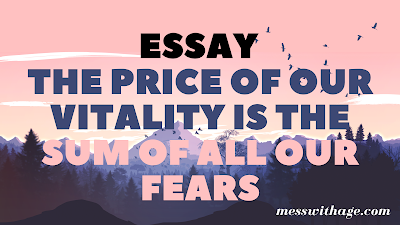Essay on The price of our vitality is the sum of all our fears
Some things scare us. We might be afraid of heights, spiders, or even just a big city. But what does fear have to do with productivity and success? When we’re afraid there is a gap between what we want or need and what is possible.
What we fear determines the type of people we become.
If you're afraid of something, it can make you more cautious. Fear makes people defensive and
aggressive. Fear makes them feel like they need to protect themselves from the world.
Fear can also make us less likely to engage with others or take risks—and as a result, we become
more isolated than we would be otherwise.
What we fear reveals how much we care about ourselves and the world around us.
Fear is a powerful emotion. It can be used to motivate us to do things, but it can also hold us back
from taking action. Fear of the unknown makes us feel vulnerable, powerless, and weak; therefore,
it's easy for us to avoid situations where we might feel this way (for example: speaking in public).
Fear of being judged by others is another common source of fear that often hinders our ability to
make decisions or take action on our own behalf. This type of fear arises when we believe others will
judge us harshly if they discover what we're doing or saying—and they'll probably be right! If you're
afraid that someone might think less of your intelligence because you don't know something new (or
worse yet—that they'll think less of your value as a human being), then there's nothing wrong with
asking questions about those topics beforehand so everyone understands where everyone else
stands on matters like these before bringing them up during conversation at work parties later
tonight."
Our fears define our priorities in life
Fear is a curious thing. It can lead us to act and make decisions based on what we're afraid of, but it
also holds us back from accomplishing our goals and achieving our dreams.
It's easy to see how this works when you think about how we typically use fear as a motivator in our
lives. We fear failure so much that we don't even try anything new or difficult; we're scared of trying
something new because there's always the risk that it won't work out well for us—and then there's
the added anxiety factor of dealing with disappointment if things go wrong.
We also tend to be afraid of missing out on something if we don't know about it yet: that could
mean missing out on an interesting conversation with someone else at work or school who knows
more than me because they've heard rumours about their job being eliminated next week due to
budget cuts (or whatever). This could also mean missing out on an opportunity for advancement
within my current position which would allow me access to other departments where I might have
more opportunities for growth over time--but again there are always risks involved with taking those
steps forward!
We fear things that make us feel vulnerable, powerless, or weak
Fear is a natural part of the human condition. We fear things that make us feel vulnerable, powerless,
or weak. Fear helps protect us from danger and helps us avoid it when possible. It also serves a
protective function; for example, if you're afraid of heights or spiders, then you'll be less likely to
encounter them in your daily life because you will be vigilant about avoiding their presence as much
as possible—and this can save your life!
Fear is not just about avoiding physical threats like snakes or bears—it can also apply to
psychological ones such as death itself (which most people think about when they hear "death").
Fear of death may cause some people with strong religious beliefs such as Christianity or Islam who
have been exposed to these teachings since childhood years ago to become anxious around funerals
due not only because they believe in an afterlife but also because they believe there could be an eternal
punishment waiting after death based on sins committed during one's lifetime here on earth."
We may fear things that scare us because they pose a threat to our identity
The concept of identity is a complex one. It is influenced by our environment, experiences, and
relationships. We form an identity based on these influences and it is not static; it changes as we
mature and adapt to new situations. Fear can be a threat to our identities because it challenges the
very thing that makes us unique or special from others—our individuality—and this makes us feel
vulnerable if we cannot control it (Perryman & Jackson-Maldonado).
For example: If you are afraid of heights then this will prevent you from enjoying life to its fullest
extent because there may be some situations where heights could pose danger for you such as
climbing up buildings or mountains during hiking tours etc...
Fear reveals how much we trust ourselves, others, and the world around us
When we feel afraid of
something or someone—whether it be a person or a situation—it shows that there is something
about them that makes us feel vulnerable. In other words, fear shows us how much powerlessness
we have within ourselves and our relationships with others.
To put it another way: Fear can be seen as a sign that you don't trust yourself to be able to handle
whatever life throws at you. If someone says "I'm not ready" when they mean "I don't want
something", then maybe they're actually saying "I'm afraid". You might even hear someone say "I'll
try" when they mean "I won't succeed", which means they're also saying "I'm afraid".
Fear can be self-preserving
Fear can be a good thing. It's natural and necessary for our survival, but sometimes fear can go too
far and cause us to make mistakes or avoid taking risks that would lead to success.
Fear is a response to uncertainty, which is why it's important not only in sports but also in life: if you
don't know what the outcome will be then there are things you should consider doing differently so
as not to get hurt or killed by unknown circumstances (like running through traffic). The same
principle applies when dealing with other people as well; some say that we're all afraid of death
because we want immortality instead!
We all have different fears based on our experiences throughout our lives; whether they're personal
experiences such as losing loved ones or traumatic events like war zones (I've experienced both), but
fear always serves its purpose at some point during those moments when we need guidance from
within ourselves: no matter how hard it seems sometimes getting through certain situations doesn't
mean giving up completely--it just means finding another path forward instead!
Fear of not measuring up to expectations can be paralyzing
We fear that if we fail in some way, or
don't meet expectations, our lives will fall apart and there will be no one around to help us pick up
the pieces. This fear can make it hard for you to relax and enjoy life with your friends.
When people see something they want, they work hard toward achieving it because they know how
important it is for them personally—or even if only for their own sake! But when we don't measure
up well enough (or at all), we don't feel like we deserve anything good at all
When we're afraid there is a gap between what we want or need and what is possible
Fear can be a motivator. It can also be a hindrance, and it's not always easy to tell the difference
between the two. Fear is a natural response to danger; it's how we keep ourselves safe from threats
like predators, disease or injury. When we're afraid there is a gap between what we want or need and
what is possible—we don't know if our actions will lead us into danger so we become paralyzed by
worry about making mistakes that could put us at risk of harm (i.e., "I'm going home alone!").
Fear can also help keep you focused on something important but not necessarily in an ideal way: if
there's something important enough for you not only to have this fear but also be driven by it
toward some kind of action then chances are good those actions won't be helpful towards reaching
your goal anyway.
We all have fears. What matters is what we do as a result of them
You might be wondering, what exactly is fear? Fear is a natural response to uncertainty. In fact, it's
one of the most important parts of our survival instincts, which are designed to keep us safe from
predators and other threats. When we're in danger, our bodies release hormones like adrenaline and
cortisol. These hormones help us cope with stress by making us more alert and aware of our
surroundings—but they also can cause anxiety if we're not careful about how they affect us over
time.
Fear can be an obstacle on the road to success; however, if you learn how it works within your body
(and then use that knowledge wisely), then fear may become an opportunity for growth instead!
Conclusion
We are all afraid of something. We all have fears, and those fears define how we interact with the
world around us. But what matters is not what we fear, but how we overcome our fears through
action. The challenge of life is to make good choices when faced with uncertainty or danger; if you
want better results in your life as an adult or parent then take action now!















No comments:
Post a Comment
Please do not enter any spam link in the comment box